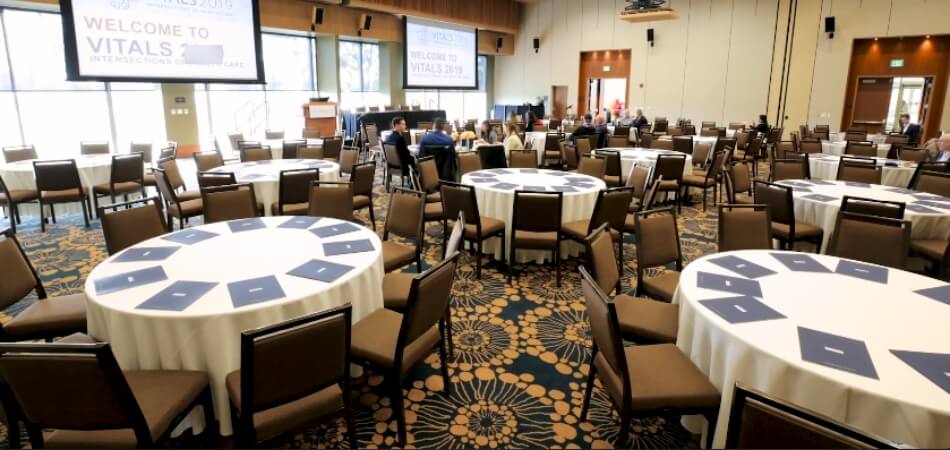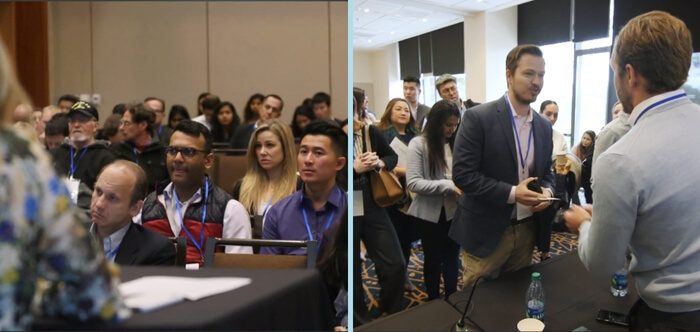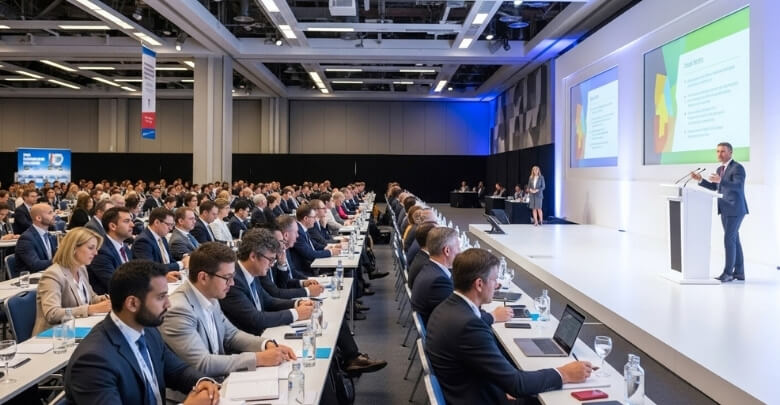International conferences happen across the world every year, bringing together people from many backgrounds. They are known for gathering experts, students, and professionals into one place where ideas can be exchanged. Many readers often wonder about the benefits of attending international conferences.
Attending an international conference helps you build strong connections with professionals, gain insights from expert talks, and explore the latest tools and trends. You can also present your work, get useful feedback, and find new opportunities in your field. These events support both personal and professional growth, and they often lead to long-term value for your future.
Curious to know more? Then keep reading—this article covers everything you need to know about the topic, explained in a simple and helpful way.
Benefits of Attending International Conferences
Attending an international conference is more than just listening to lectures. It is an experience where you meet people, exchange ideas, and see what’s impacting your field. Let’s look at the conference benefits you can gain from it.
Strong Connections
These events bring together professionals, researchers, and leaders from different parts of the world. A small chat can turn into future teamwork or mentorship. Connections made here can support your career and open unexpected doors. Networking in person always feels more genuine.
Expert Insights
Sessions are often led by people who are directly involved in the latest projects and research. Their talks give you first-hand knowledge that goes beyond books or online updates. You can ask questions and get clear answers right away. That makes learning both practical and reliable.
Future Opportunities
Many chances come up unexpectedly at international conferences, like collaboration offers or invitations to other events. You may also learn about scholarships, projects, or job openings. Each discussion or meeting can lead to something valuable. The more active you are, the more options you find.
Voice on Stage
When you present your own work, it shows your commitment and skills. You receive feedback from experts who can help refine your ideas. Speaking at a global event also builds trust and recognition. It leaves a lasting mark on your professional profile.
New Perspectives
Hearing from people across cultures helps you see things differently. Each talk or conversation can shift how you think about your own work. Diverse viewpoints encourage fresh solutions to old problems. It pushes you to think in new directions.
Professional Value
Attending international conferences reflects dedication and seriousness in your field. It shows employers and peers that you are active and engaged. This visibility builds your professional reputation over time. Being recognized can help you reach higher positions or roles.
Latest Tools
Conference exhibitions often highlight new software, machines, or systems. Seeing them in action gives you a better idea of how they work. This helps you decide which ones can improve your work. Being early to adopt these tools gives you an advantage.
Personal Growth
Traveling abroad for a conference builds confidence and adaptability. Meeting people from different backgrounds improves your communication and soft skills. These experiences help you adjust to new situations with ease. Growth in such areas benefits both career and personal life.
Who Benefits Most By Joining International Conferences?
International conferences are held all over the world and attract a broad range of individuals. These gatherings are not limited to one group, but different kinds of participants find real value in them. Here is who benefits most from these events.
Academics
Teachers, scholars, and researchers often attend to share their findings and learn about new studies. Conferences give them a chance to publish their work, receive feedback, and connect with other experts. This helps improve their research quality and professional standing. They also discover new ideas to apply in classrooms or future studies.
Researchers
Researchers benefit by testing their ideas in front of an informed audience. They can meet others working on similar projects and find chances to collaborate. Discussions at conferences often highlight new methods or approaches. This exposure to different styles makes their research stronger.
Industry Experts
Professionals from business or technology sectors gain insights into the latest market trends. They can attend workshops, see product launches, and connect with clients or partners. Industry leaders often share real-world experiences that others can learn from. These opportunities keep them competitive in fast-changing markets.
Policymakers
Government officials and decision-makers attend to understand global challenges and new policy ideas. Conferences provide them with a platform to discuss solutions with experts worldwide. These talks highlight the purpose of international conferences, which is to encourage discussion and cooperation. They also create channels for working together across countries.
Students
Students benefit by learning from experts and exploring real applications of their studies. Meeting professionals helps them build networks for future careers. Presenting their projects boosts their confidence and recognition. These experiences often guide their career choices in practical ways.
Entrepreneurs
Business founders and innovators gain inspiration and resources from international conferences. They can pitch ideas, meet investors, or explore partnerships. Conferences also introduce them to new technologies and market opportunities. These connections can help them expand their businesses on a global scale.
Steps Attendees Can Take to Join an International Conference
Joining an international conference is not as hard as it may sound at first. You just need to follow a few clear steps and prepare things on time. Let’s walk through what to do, step by step, to make it happen smoothly.
Pick the Right Event
Start by choosing a conference that matches your field or interest. Make sure it’s organized by a trusted group and has real speakers and a proper schedule. Look at past events to see if they had good reviews. Picking the right event makes everything else easier.
Check Requirements
Read the conference website carefully to know what you need. Some ask for an abstract or a short summary of your topic if you want to present. Others may just ask for registration. Understanding the rules early helps avoid mistakes or delays.
Complete Registration
Once you decide to join, register before the deadline. Some events offer early-bird discounts, so booking early can save money. Fill out the form with the correct details and keep a copy of your confirmation. This step is simple but very important.
Arrange Travel Documents
If the event is in another country, you may need a visa. Check the country’s visa process and apply as early as possible. You might need an invitation letter from the conference, which is usually provided after registration. Don’t forget to keep your passport updated.
Plan Your Trip
Book your flight and hotel once your visa is approved. Try to stay close to the venue so it’s easy to attend all sessions. Also, check the weather, currency, and other basics before you go. A bit of planning can make the trip smooth and stress-free.
Prepare to Attend
Make a checklist of what to carry, like your ID, tickets, charger, notebook, and any presentation material. If you’re speaking, practice your talk a few times. Keep your outfit ready and arrive early at the venue. Being prepared helps you enjoy the event more.
Popular Types of International Conferences People Can Attend
International conferences are held in many fields and cover a large range of topics. Each one brings together different groups of people who care about that subject. Here are some of the most common international conferences that people frequently attend:
Science and Research
These conferences focus on new discoveries in areas like biology, physics, or chemistry. Researchers present their work, and others give feedback or ask questions. It helps everyone stay updated and improve their studies. Many research papers are first shared in these events.
Business and Economics
People in business, finance, or economics join to learn about trends and market changes. Experts share tips, case studies, and success stories. Attendees also find new contacts for deals or future work. These events help improve business knowledge and build strong networks.
Health and Medicine
Doctors, nurses, and health experts attend to learn about new treatments and healthcare methods. They share their studies, attend training sessions, and talk with others in their field. These conferences help improve patient care and promote better health systems.
Technology and Engineering
Tech professionals and engineers gather to talk about tools, software, machines, and smart systems. New inventions and updates are often launched at these events. Attendees get hands-on demos and learn useful skills. These conferences often include workshops and live examples.
Social and Cultural
These events focus on society, history, art, or languages. Writers, artists, and social experts meet to discuss ideas, share work, and learn from each other. Some events include performances or exhibitions. They help people understand different ways of thinking and living.
Environment and Climate
Environmental conferences bring together people who care about nature and climate change. They talk about clean energy, wildlife, pollution, and sustainability. These events often include scientists, leaders, and everyday people. Everyone works together to find better ways to protect the planet.
Is It Challenging to Identify the Appropriate International Conferences?
Finding the right international conference can sometimes feel confusing because there are countless events advertised. Many appear legitimate, but some lack credibility. Careful planning, checking organizers, and comparing details make the process easier and more effective for participants worldwide.
One must look at past speakers, review agendas, and confirm official recognition before registering. Choosing wisely and attending right International Conference gives participants knowledge, networking, and opportunities. Without proper checks, attendees may waste money, time, and miss chances for genuine growth across their professional or academic interests.
People should trust reliable sources, society websites, or well-known institutions while searching. Reviews and personal recommendations add extra clarity for conference selection. Taking small, smart steps will make identifying the appropriate conference less challenging, saving effort and ensuring maximum long-term value.
Tips for Making the Most of an International Conference
Attending an international conference is more than just sitting in halls and hearing talks. It is about using your time wisely, meeting the right people, and learning as much as possible. Let’s look at how you can make the most of these events.
Plan Ahead
Check the schedule before the event starts and mark the sessions that matter most to you. Knowing what to attend saves time and avoids missing important talks. Planning early also helps balance between sessions, networking, and breaks. A simple plan keeps your day smooth and useful.
Connect with People
Conferences are perfect places to meet others who share your interests. Introduce yourself and exchange contacts with professionals and speakers. Short but meaningful talks often turn into long-term connections. Meeting people face to face always leaves a lasting impression.
Join Discussions
Do not just sit and listen—ask questions during sessions. Joining discussions shows interest and helps you understand topics better. It also makes others notice you in the room. Being active in conversations adds value to your experience.
Take Good Notes
Write down key ideas, tips, or names of people you meet. Notes help you remember details that you can use later. Keep them organized so they are easy to review after the event. Good notes often become a resource for future projects.
Explore Exhibits
Many conferences include stalls or displays of new tools and products. Visit them to learn what is trending in your field. Talking to exhibitors can give you practical ideas. Sometimes you even discover solutions that help in your own work.
Share Your Learnings
Post updates on social media or share your experience with your team. Sharing spreads knowledge and builds your professional image. It also shows you are actively involved in your field. People often remember those who share useful insights.
Follow Up Later
After the event, send a short message or email to people you met. Thank them and remind them of your chat. Following up strengthens connections and keeps doors open for the future. This step is as important as attending the event itself.
Frequently Asked Questions
A lot of people, particularly those who have never attended an international conference before, have questions. Below, you’ll find helpful answers to common queries that people often have when thinking about joining one.
How Do International Conferences Help With Skill Development?
International conferences provide training through workshops, presentations, and panel discussions. Attendees get practical knowledge, updated methods, and useful strategies from experts. This continuous learning improves their problem-solving ability and helps them handle new challenges effectively.
Can Attending Conferences Boost Career Opportunities?
Yes, attending conferences often leads to new job openings, collaborations, or speaking invitations. Meeting professionals face to face increases credibility. Employers also value candidates who attend global events, as it shows commitment and professional growth.
What Role Do Conferences Play in Leadership Development?
International conferences give participants a platform to lead discussions or chair sessions. These responsibilities improve decision-making and leadership skills. Being recognized as a leader also strengthens professional reputation.
Are International Conferences Useful for Entrepreneurs?
Yes, business owners gain access to investors, partners, and new markets. They can present their products and ideas to a global audience. This visibility often creates opportunities for growth and expansion.
What Is the Main Purpose of Attending Conferences?
The main purpose of attending conferences is to share knowledge and ideas in a group setting. They connect people from different backgrounds for meaningful discussions. These events also build networks and create opportunities for personal, academic, and professional growth.
Do Conferences Improve Problem-solving Skills?
Yes, listening to diverse case studies teaches practical approaches. Participants learn how others solve issues in different settings. These insights improve their ability to solve problems creatively.
What Should I Ask People I Meet at a Conference?
You can ask about their work, what sessions they enjoyed, or what tools they use. Keep your questions simple and friendly. This helps start easy conversations. Asking good questions can lead to helpful answers and lasting connections.
Concluding Words
International conferences create moments that stay with you long after the event ends. They are more than schedules, halls, or sessions; they are gateways to growth and discovery that shape both professional and personal lives in meaningful ways.
The benefits of attending international conferences are wide-ranging, from learning directly from experts to building trusted connections that last for years. They give you the chance to share your ideas, gain recognition, and explore tools that can make real differences.
Every experience at such events adds something valuable—whether it is knowledge, confidence, or opportunity. Stepping into these gatherings means stepping into a world of ideas, cultures, and chances that continue to support you well into the future.








